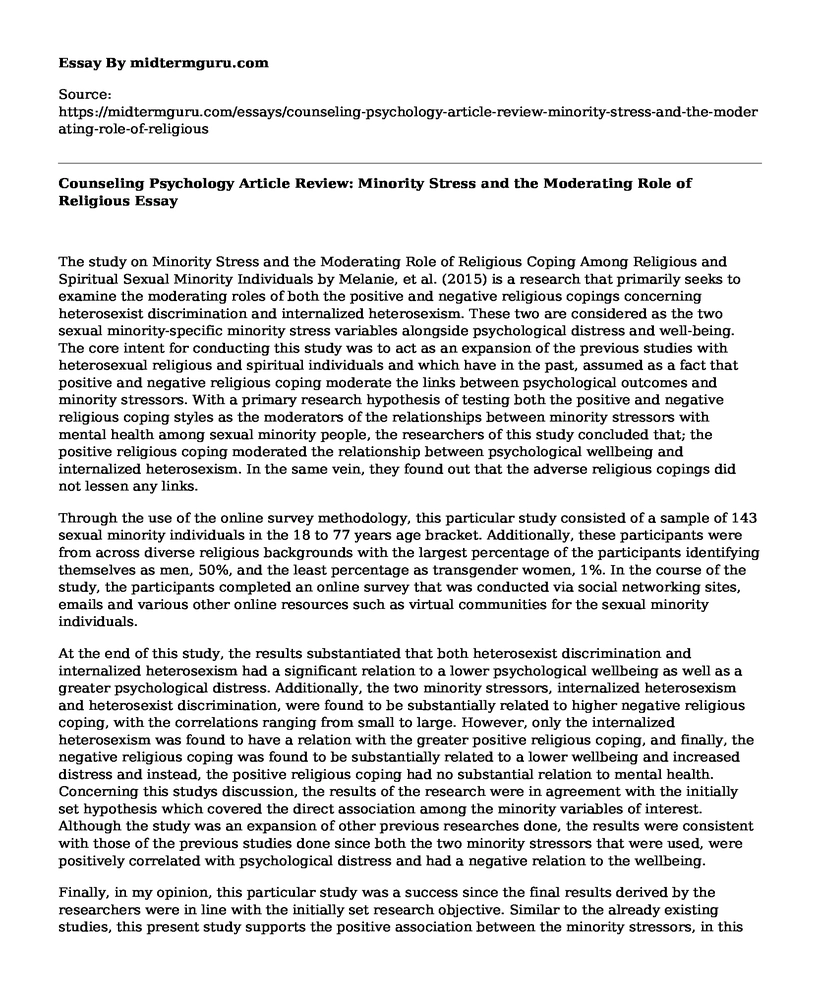The study on Minority Stress and the Moderating Role of Religious Coping Among Religious and Spiritual Sexual Minority Individuals by Melanie, et al. (2015) is a research that primarily seeks to examine the moderating roles of both the positive and negative religious copings concerning heterosexist discrimination and internalized heterosexism. These two are considered as the two sexual minority-specific minority stress variables alongside psychological distress and well-being. The core intent for conducting this study was to act as an expansion of the previous studies with heterosexual religious and spiritual individuals and which have in the past, assumed as a fact that positive and negative religious coping moderate the links between psychological outcomes and minority stressors. With a primary research hypothesis of testing both the positive and negative religious coping styles as the moderators of the relationships between minority stressors with mental health among sexual minority people, the researchers of this study concluded that; the positive religious coping moderated the relationship between psychological wellbeing and internalized heterosexism. In the same vein, they found out that the adverse religious copings did not lessen any links.
Through the use of the online survey methodology, this particular study consisted of a sample of 143 sexual minority individuals in the 18 to 77 years age bracket. Additionally, these participants were from across diverse religious backgrounds with the largest percentage of the participants identifying themselves as men, 50%, and the least percentage as transgender women, 1%. In the course of the study, the participants completed an online survey that was conducted via social networking sites, emails and various other online resources such as virtual communities for the sexual minority individuals.
At the end of this study, the results substantiated that both heterosexist discrimination and internalized heterosexism had a significant relation to a lower psychological wellbeing as well as a greater psychological distress. Additionally, the two minority stressors, internalized heterosexism and heterosexist discrimination, were found to be substantially related to higher negative religious coping, with the correlations ranging from small to large. However, only the internalized heterosexism was found to have a relation with the greater positive religious coping, and finally, the negative religious coping was found to be substantially related to a lower wellbeing and increased distress and instead, the positive religious coping had no substantial relation to mental health. Concerning this studys discussion, the results of the research were in agreement with the initially set hypothesis which covered the direct association among the minority variables of interest. Although the study was an expansion of other previous researches done, the results were consistent with those of the previous studies done since both the two minority stressors that were used, were positively correlated with psychological distress and had a negative relation to the wellbeing.
Finally, in my opinion, this particular study was a success since the final results derived by the researchers were in line with the initially set research objective. Similar to the already existing studies, this present study supports the positive association between the minority stressors, in this case, the internalized heterosexism and heterosexist discrimination, and the poor psychological wellbeing of these sexual minority individuals. In my opinion, if this study were to be repeated, I would suggest that more implications are made in relation to the participants with no particular religious beliefs. This should be a lot more expounded and hence giving the relationship between the well-being of the sexual minority individual regarding the beliefs and practices of their society other than exclusively on their religion. Additionally, in its future improvement, this study should incorporate non-believers and atheists in their final research sample. By so doing, the study will be able to put across the results of how those non-believing sexual minorities are particularly affected and how they cope with the minority stressors both mentally and socially.
References
Brewster, M. E., Velez, B. L., Foster, A., Esposito, J., & Robinson, M. A. (2016). Minority stress and the moderating role of religious coping among religious and spiritual sexual minority individuals. Journal of Counseling Psychology, 63(1), 119-126. doi:10.1037/cou0000121
Cite this page
Counseling Psychology Article Review: Minority Stress and the Moderating Role of Religious. (2021, Jun 02). Retrieved from https://midtermguru.com/essays/counseling-psychology-article-review-minority-stress-and-the-moderating-role-of-religious
If you are the original author of this essay and no longer wish to have it published on the midtermguru.com website, please click below to request its removal:
- Essay on Mental Health Movement Focusing on Deinstitutionalization
- Research Paper on Protestant Movements
- Essay Sample on Stories That Inspire Advocacy
- Paper Example on Strategic Family Therapy
- Essay Sample on Negative Effects of Parental Depression on Dependent Children
- Tackling Depression in Older Adults: Engaging All Stakeholders - Research Paper
- Unveiling Jesus & His Followers in the Roman Empire - Essay Sample







